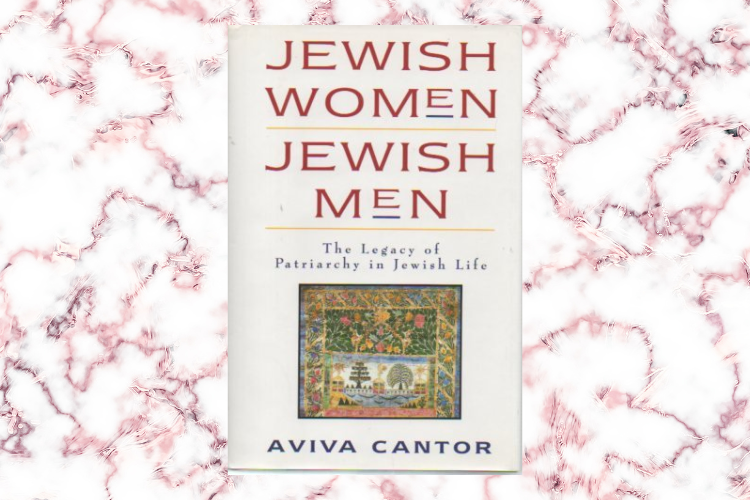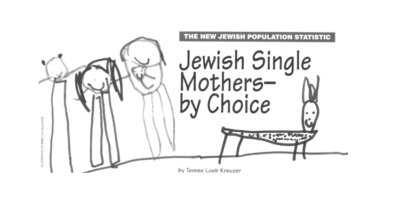
Jewish Women/Jewish Men: The Legacy of Patriarchy in Jewish Life
Jewish Women/Jewish Men: The Legacy of Patriarchy in Jewish Life
by Aviva Cantor
[New York: HarperCollins, 1995, $32.50]
Jewish Women/Jewish Men is a sprawling and passionate polemic. With all of Jewish experience from the Bible to contemporary Israeli and American Jewry as the backdrop for her inquiry, Aviva Cantor raises important questions about the ways in which patriarchy within Judaism and Jewish culture has affected both Jewish women and men. She argues that Jewish masculine and feminine roles can best be understood as responses to the powerlessness of Jews, particularly in the Diaspora. She theorizes that, unable to offer protection to their women, Jewish men developed a model of masculinity that disparaged physical prowess, and a model of femininity that encouraged women to be enablers in the service of communal survival.
According to Cantor, assimilation in the modern period has not only eroded traditional beliefs but has also transformed gender roles. This has inevitably led to tensions between Jewish men and women, and to male resistance to female equality as Jewish men have sought to construct a new form of masculinity for themselves.
Cantor does not present a sustained chronological narrative, but instead offers nuggets of information and speculation. She tends toward sweeping generalizations, asserting, for example, that earning a living was gender-neutral in most periods of Jewish history, and that in the East European shtetl, women were entirely responsible for supporting the family.
There is simply no historical evidence for these blanket assertions. This book does not distinguish between assimilation and assimilationism, incorporating the former into the latter as a plot foisted on the Jewish masses by the Jewish elite in collaboration with the “ruling class” of western nation states. Cantor is fond of the tantalizing analogy—for example, between the excommunication of Baruch Spinoza in 17th century Amsterdam and the distancing of Argentinean Jewish leaders from radicals within their own community.
As a feminist Jewish historian, I was disappointed that Cantor did not avail herself of much of the feminist literature that has been published in the past 15 years. Even recent non-feminist scholarship is not reflected in these pages; her most frequent references are to the now superseded work of long dead scholars like Simon Dubnow, Alexander Marx, Max Margolis and Israel Abrahams.
When she does include some recent scholarship in her bibliography, she tends to ignore its findings when it fails to advance her argument. For example, she does not incorporate David Biale’s evidence, presented in Eros and the Jews, that Jewish attitudes toward sexuality were far more ambivalent than is generally recognized. Instead, she cites (out of context) precisely the text that Biale uses as his case in point—the medieval Iggeret Hakodesh. Similarly, she draws upon Sydney Weinberg’s World of Our Mothers, but omits her important point that birth order was more important than gender in the access to education of children of immigrants.
Jewish Women/Jewish Men does offer its readers a valuable service, however, in the provocative questions it poses. How has the feminized situation of Jewish men influenced Jewish culture and survival strategies? Cantor suggests that Jewish men, being powerless, incorporated what she calls the “female” virtues of interdependence, cooperation and non-violence into Judaism, creating a “reformed patriarchy.” If domestic violence was more contained in Jewish communities than in others where men also felt themselves powerless, as Cantor contends, what were the mechanisms Jews found for achieving relative domestic harmony? (Recent studies suggest, however, that domestic violence was far more widespread historically in Jewish societies than conventional wisdom would have us believe.) Was the kibbutz a “female” institution because of its communal ethos, as Cantor suggests?
Cantor’s focus on the interesting parallels between Jews and women leads her to suggest that anti-Semitism must be seen through a gendered lens. It is highly imaginative to assert, as Cantor does, that anti-Semitism was a strategy employed by Christians for keeping the masses away from the female values of Judaism and that “the Holocaust is an extreme…example of the deployment of these strategies to eradicate Jews and the female values that informed their communities.” Our sensitivity to gender and anti-Semitism is central in understanding the anti-Semitism of JAP and Jewish mother jokes and in formulating communal anti-defamation strategies.
When she turns to the historical experience of women themselves in the modern period. Cantor does not credit the self-empowerment of women who worked within the constraints of bourgeois societies to expand their influence, largely through the women’s philanthropic and social welfare organizations that they established. Instead, she faults these organizations.
Most surprisingly, she seems unwilling to acknowledge the accomplishments of American Jewish feminism of the past generation. A staunch secularist, she finds the religious focus of Jewish feminism in America to have diverted Jewish women from addressing the far-reaching changes in American and Jewish society that she considers necessary for the eradication of patriarchy. While even conservative commentators of the American Jewish scene have pointed to the powerful impact of feminism on American Judaism, Cantor dismisses the significance of egalitarianism within non- Orthodox synagogues and the emergence in the community of hundreds of women rabbis and cantors. Yet, along with female Judaic Studies scholars and lay communal leaders, women rabbis and cantors provide role models for children and a richer diversity of perspectives than was ever available to American Jews. Although Cantor is right to point out what we still must achieve, that is no reason to downplay the changes that feminists have effected in Jewish life.
We need not agree with all of Aviva Cantor’s assertions, however, to take seriously her challenge to today’s Jewish feminists. Jewish feminism, she concludes, “provides the only hope for…a constructive course correction” that will further the survival of Jews and Judaism in America.
Paula E. Hyman, Lucy Moses Professor of Modern Jewish History at Yale University, is the author of numerous articles and several books, including Gender and Assimilation in Modern Jewish History




